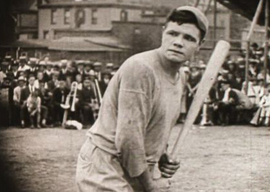
April 18, 2012

Babe Ruth
In the majors, lefties are common in the outfield and at first base because they enjoy a significant batting advantage. By one common measure, OPS+, seven of the all-time top ten hitters have been left-handed, including the top four. In contrast, lefties are vanishingly rare at second base, shortstop, and third base because throwing to first is more awkward for them.
There are numerous theories about why catchers are always right-handed, none of them hugely persuasive. For instance, right-handed catchers can throw better to third because their arm movement is across their torsos, but a hypothetical left-handed catcher would throw better to first on pickoffs, bunts, and dribblers.
In comparison, everybody agrees that left-handers have defensive advantages at first base, yet about three-quarters of first basemen are right-handed.
But why are there no left-handed catchers?
Many other rationalizations have been proposed, none decisive. For example, Bill James argues that strong-armed left-handers are always converted to pitcher. But transforming a talented young left-handed catcher with a good but not great fastball to pitcher on the grounds that everybody knows left-handed catchers aren”t allowed in pro ball is likely dooming him to failure.
Perhaps the most plausible theory is John Walsh’s: A century ago, lefties were stereotyped as too flaky to be trusted with the main leadership position. Think of old-time lefties such as not-quite-right-in-the-head Rube Waddell, angry Ty Cobb, fun-loving Babe Ruth, comical Lefty Gomez, and the irascible Lefty Grove. Today, though, we are as likely to think of stalwart portsiders such as Stan Musial, Sandy Koufax, and Warren Spahn, who had thirteen twenty-win seasons after being wounded at the Battle of the Bulge.
Yet few care in any organized fashion about discrimination against left-handers. To garner the political heft to become what psychologist Jonathan Haidt calls a “sacralized” victim group, people evidently need to build solidarity along ties of race, sex, language, sexuality, or so forth. Lefties are too random to count. Thus, there is no Left-Hander History Month on PBS, no Left-Hander Studies programs at major universities, and no left-handed equivalent of Al Sharpton arguing on TV about left-handers” rights and how the very word “rights” is a wrong against his people.